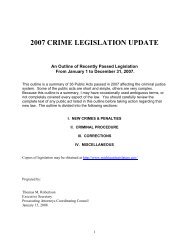Traditional Probation & Intensive Supervision ... - Ottawa County
Traditional Probation & Intensive Supervision ... - Ottawa County
Traditional Probation & Intensive Supervision ... - Ottawa County
You also want an ePaper? Increase the reach of your titles
YUMPU automatically turns print PDFs into web optimized ePapers that Google loves.
Recommendation:In order to improve accountability, consider developing apolicy whereby it is standard protocol for an offender tohave probation revoked as a result of committing a seriousnew offense while in the program.4. By design, ISP demands an increased level of accountability for offenders. This accountability isachieved, primarily, through home and office visits, as well as drug and alcohol testing. Although thenumbers are relatively small, 3 (1.3%) of the 232 total ISP probationers involved in this study did notreceive a home visit during participation in the program, and 17 (7.3%) of the ISP probationers werenot required to have an office visit. Additionally, 20 (8.6%) ISP probationers did not have a drug testand 2 (0.9%) did not receive an alcohol test. While some of these ISP probationers who did notreceive visits and/or tests were revoked from the program within one month of being sentenced, otherswho were revoked within one month did receive visits and/or tests.A point of greater significance, however, is that 43 (20.3%) of the 212 ISP probationers who did receivedrug testing did not receive a test during their first month in the program, and 36 (15.7%) of the 230 ISPprobationers who received alcohol testing did not receive a test during their first month in the program.Recommendation:In order to improve accountability, ensure that all ISPprobationers begin drug and alcohol testing during the firstmonth of the program as well as begin receiving home andoffice visits immediately upon entry into the program.5. The following conclusion is not the result of data analyzed as part of this report; however, theinformation did surface during discussions with criminal justice employees. Due to the fact that itpertains to the ISP program, it has been included as part of this report.Another component of ensuring offender accountability is the home visit conducted by an ISP Officer.This can potentially result in a difficult and/or uncomfortable situation for the Officer. Even though anoffender may not be viewed as violent, there is the chance that, in their own surroundings, the offendermay be more apt to be confrontational. Additionally, because ISP Officers are employees of the Courtand not the Sheriff’s Office, they do not receive the same level of training that deputies receive. Thistype of training could address the handling of hostile situations and ensure that professional boundariesare maintained.Recommendation:Provide additional training for ISP Officers to help ensuretheir safety when conducting home visits. Also, establish aprotocol requiring an Officer to call Central Dispatch whenentering and exiting an offender’s home during field visits.6. Convicted offenders with similar criminal histories, demographics, and mental health and substanceabuse issues are not randomly assigned to different treatment programs and/or different providers. Thismakes it difficult to identify which variables may influence recidivism. In order to determine whether aparticular program, treatment, or treatment provider is effective at reducing an offender’s propensity torecidivate, a prospective random assignment study should be implemented.Recommendation:Consider randomly assigning offenders with similarcriminal histories, demographics, and mental health andsubstance abuse issues to different treatment programs,types of treatment, and treatment providers for evaluationpurposes.Evaluation: <strong>Traditional</strong> and ISP <strong>Probation</strong> Page 33 Prepared by: <strong>Ottawa</strong> <strong>County</strong> Planning Department (08/03/07)
















